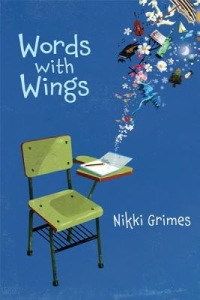Reviews of the 2014 CSK Author Award winners
Winner: P.
 Winner:
Winner: (Amistad/HarperCollins)
Against Big Ma’s objections, in One Crazy Summer (rev. 3/10) Delphine and her sisters Vonetta and Fern flew off to Oakland to get to know their mother, Cecile, and learned about the Black Panthers. Here, they’ve returned, and before they even get home to Bedford-Stuyvesant, they outrage Big Ma, making a “grand Negro spectacle” of themselves at the airport by refusing to be invisible and docile. For Delphine, this new stage of life is tricky to maneuver. Pa is suddenly happy, with a new “lady friend”; their uncle returns from Vietnam but seems greatly changed; and her sisters have learned to stand up for themselves, refusing to let Delphine take charge in her usual way. She tries to better understand why her parents never married, but Cecile sets her straight in letters, establishing boundaries (“My feelings about your father are mine. They are not feelings that can be understood by a young girl”) and reminding her repeatedly to “be eleven.” Williams-Garcia evokes the late-sixties time period perfectly with word choices (“right on!”), clothing details (Delphine longs for bell-bottoms), and other specific references, especially the instant, passionate devotion the sisters feel toward the Jackson Five. And as in the multi-medaled previous book, she brilliantly gets to the very heart of Delphine and each of her family members and friends, using Delphine’s keen perceptions (“Big Ma put a smile over her real face…”) to create complex, engaging, and nuanced characters. Funny, wise, poignant, and thought-provoking, this will leave readers wanting more about Delphine and her sisters. SUSAN DOVE LEMPKE
 Honor:
Honor: (Top Shelf Productions)
Congressman John Lewis — the last surviving member of the “Big Six” civil rights leaders — recounts his formative years in this first volume of a planned trilogy. The book opens on “Bloody Sunday,” as troopers assail activists (including Lewis) marching across the Edmund Pettus Bridge. From this violently chaotic event the narrative fast-forwards to the early morning of Barack Obama’s January 2009 inauguration, where Lewis shares his memories with young visitors to his congressional office. Lewis’s path to nonviolence was shaped by two key events: the Montgomery Bus Boycott and a 1955 radio broadcast of Martin Luther King Jr. preaching “the Social Gospel.” While attending seminary in Nashville, Tennessee, John joined up with other young people fighting segregation with nonviolence to form the Nashville Student Movement. (A nifty example of art imitating life: the group was informed by a popular comic book of the time — Martin Luther King and the Montgomery Story.) There’s something extraordinary about reading a firsthand account of a seminal moment in history from one who not only lived through it but also led it, and this is what ultimately makes this book so essential. The volume is well-designed and the story expertly paced — the flashbacks and flash-forwards are especially effective at keeping things moving. Powell re-creates the time period vividly through his black-and-white art, but the artist’s true gift is in his ability to capture emotion with deft use of line and shadow. His nuanced visual storytelling complements Lewis’s account beautifully. SAM BLOOM
 Honor: Darius & Twig by Walter Dean Myers
Honor: Darius & Twig by Walter Dean Myers(HarperCollins/Amistad)
Darius, an aspiring writer, and Twig, his star-runner best friend, both want more than Harlem can offer. But even as they begin to experience success in their respective endeavors, violence, bullies, and opportunistic adults threaten their dreams. Myers's usual fire seems replaced by cynicism, but the boys' friendship is well-developed and their desire to succeed despite obstacles is admirable and relatable. RANDY RIBAY
 Honor: Words with Wings by Nikki Grimes
Honor: Words with Wings by Nikki Grimes(Highlights/WordSong)
After Gabby's dad moved out, she "didn't cry. Instead, / I filled the quiet / with daydreams." She has trouble paying attention at school until a new teacher recognizes her love of words and allows Gabby time to write poetry. Told in free verse, this is a very accessible story about an appealing child who transforms from introverted daydreamer to writer. MAEVE VISSER KNOTH
RELATED
RECOMMENDED
ALREADY A SUBSCRIBER? LOG IN
We are currently offering this content for free. Sign up now to activate your personal profile, where you can save articles for future viewing.







Add Comment :-
Be the first reader to comment.
Comment Policy: